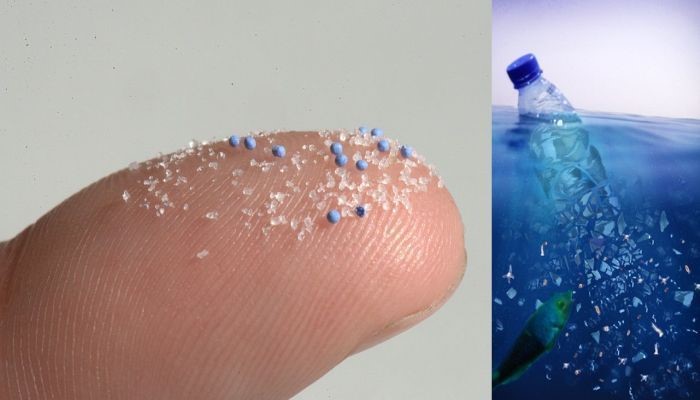Amit Hasan Anik: Micro-plastics can be defined as the smaller fragments (≥1 μm – <5 mm) of semi-synthetic plastic polymers which are highly persistent and omnipresent in the environment. Micro-plastics mainly contain polyethylene, polypropylene, polystyrene, polyvinyl chloride, nylons, poly-lactic acid, polyamide, and polyethylene terephthalate.
However, large plastic pollution was an antecedent worldwide issue whereas micro-plastics pollution is a thriving mondial concern in today’s world. During the last few years, it has taken note that impacts of micro-plastics are relatively more ticklish than macro plastics which causes increasing environmental concern about these tiny particles. Nevertheless, this emerging pollutant of our environment has been largely unexplored in the perspective of Bangladesh.
However, micro-plastics are divided into two common classes on the basis of their origin and sources, such as primary and secondary micro-plastics. Micro-plastics may enter into the environment due to indiscriminate use in industrial preproduction pellets like personal care products (primary micro-plastics) and as well as by the breakdown of larger plastic objects (secondary micro-plastics). According to the report of Environment and Social Development Organization (ESDO), 60 most prevalent and commonly used beauty and cleaning products in Bangladesh, including face wash, detergent etc. contain microbeads (segment of primary micro-plastics).
They also claimed that monthly around 8000 billion microbeads are released from the household basin and through the drainage system ended up into the surrounding water bodies of Dhaka, Chittagong & Sylhet. Besides, Bangladesh is one of the rising developing countries where consumption of plastic items has expanded than ever before. Furthermore, due to the outbreak of Covid-19, a huge number of single-use personal protective equipment (PPE) including mask, gloves, goggles and gowns are added as single use plastic waste in our environment and turned into a great source of secondary micro-plastics which creating a situation like rub salt into the wound.

Micro-plastics can be ingested by a wide range of aquatic and terrestrial species due to their small size and their abundance in both pelagic and benthic ecosystems. Recently researchers identified micro-plastics in diverse organisms from the smallest plankton to top predators like large fishes, birds and mammals which indicate pernicious effects of micro-plastics on an ecosystem.
These micro-plastics through ingestion, inhalation and translocation biomagnified along with the food web and may transfer into human body. According to the report of WHO (2019), they have found the presence of micro-plastics in treated tap and bottled water though in low level but due to regular consumption it may cause chronic effect on human health. However, the detrimental effects of micro-plastics in surrounding environment and on food chain toxicity has not yet been reported in Bangladesh whereas the global researchers has identified the role of micro-plastics as carriers of toxic pollutants responsible for adverse health effects.
Albeit, in 2002, the Bangladesh government banned lightweight plastic bags and pushed the use of jute fiber bags as an alternative. Moreover, single-use plastic products are also banned recently because they are secondary sources of micro-plastics deposition.
However, at the same time, polythene and single-use plastic products are continuously produced, traded and utilized all over the country because of the weak implementation of the law and absence of cost-effective environment-friendly alternatives. Therefore, government should introduce strong legislative rules and set ‘zero tolerance’ regarding the use of mega and macro plastics and compel the industries to use biodegradable materials like starch in lieu of non-degradable materials to lessen micro-plastics pollution.
(The writer is a student of Department of Environmental Science, Bangladesh University of Professionals (BUP), Dhaka, Bangladesh and a participant of National Environmental Writing Contest 2020. He can be reached at [email protected])

Leave a Reply